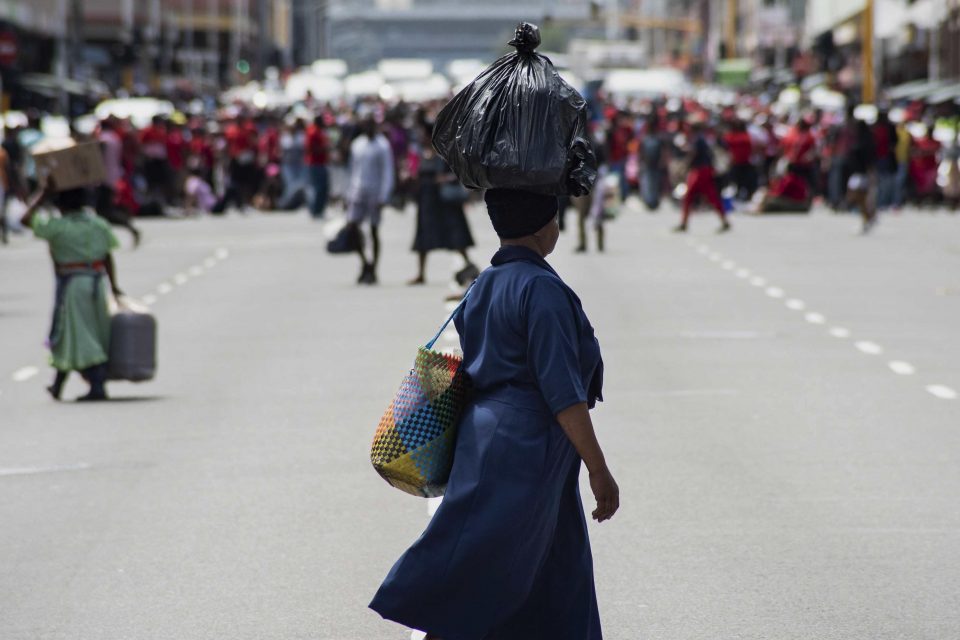SA’s hidden sanctions against political gatherings
The government’s failure to clearly stipulate the penalties for transgressing the regulations against large gatherings, which include protests, should alarm all South Africans.
Author:
2 February 2021

Just two weeks into the new year, Nkosazana Dlamini-Zuma, the minister of cooperative governance and traditional affairs, released adjusted level three lockdown regulations. As South Africa tries to address its second wave of Covid-19 infections, certain actions have understandably once again been prohibited, including gathering in large groups.
Many such actions are specifically listed in the “offences and penalties” clause of the new regulations and their consequences are clear. Yet the penalties for protests or “political gatherings” are not – instead, they are hidden in an obscure clause.
Section 84 of the adjusted level three regulations sets out the rules governing gatherings at this time. It gives guidance on how people should conduct themselves in a group. For example, regulation 84(1)(a) and (b) requires people to “wear a face mask” and to “adhere to all health protocols” when attending a specifically permitted gathering, such as in the workplace for work purposes.
The guidance is provided with the aim of limiting exposure to the coronavirus. While certain gatherings are permitted under specific conditions, other types are completely prohibited, for example, political gatherings.
Related article:
Regulation 84(3)(a) provides that “all political gatherings are prohibited”. Political gatherings are supposedly those regulated by the Regulation of Gatherings Act. I say “supposedly”, because the act regulates gatherings or protests “at which the principles, policy, actions or failure to act of any government, political party or political organisation, whether or not that party or organisation is registered in terms of any applicable law, are discussed, attacked, criticised, promoted or propagated”. As a result of this archaic act, a protest about a lack of access to services is seen as a “political gathering” because it is staged against the failures of a government.
As a fundamental democratic right, protests are embedded in the fabric of South African society. Protest actions allow us to challenge the status quo and seek accountability from the government. Moreover, “political gatherings” aid people to challenge principles, policies, acts or omissions of the government, or any other institution. Given issues of corruption and the mismanagement of public funds, it comes as no shock that the government has prohibited and criminalised protests in the name of saving lives and livelihoods.
Hiding the penalties
An interesting question is why the legislature specifically excluded the participation in or convening of “political gatherings” from regulation 87 of the “adjusted” regulations? Regulation 87 is the “offences and penalties” clause, and it provides that “for the purpose of this chapter, any person who fails to comply with or contravene a provision of regulations 82(1) and (3), 85(1), (2) and (3), and 86(1), (2), (3) and (4) of these regulations commits an offence and is, on conviction, liable to a fine or to imprisonment for a period not exceeding six months or to both such a fine and imprisonment”.
It is therefore a criminal offence, for example, to fail to abide by the curfew time; to operate a cinema, casino or restaurant after 10pm [previously 8pm]; to engage in initiation practices or celebrations thereof; or to sell, distribute and transport alcohol under the previous regulations. These practices are punishable statutory offences. It is also clear from regulation 87 what type of punishment follows the failure to comply with the specific provisions of regulations 82, 85 and 86 of the level three lockdown regulations, namely a fine or imprisonment, or both.
Related article:
Yet the sanction for convening or participating in political gatherings is unclear. In order to clear the mist, we must revisit regulation 84(17)(b) of the level three lockdown, which obliges a law enforcement officer to order participants of a prohibited gathering to disperse immediately. If participants fail or refuse to disperse, the law enforcement officer may take action subject to the Criminal Procedure Act, including arrest and detention.
Basically, regulation 84(17)(b) of the level three lockdown regulations vests power in the charging officer, guided by the relevant provisions of this act, to impose criminal charges for convening or participating in “political gatherings”. Consequently, if one is convicted for convening or participating in a “political gathering”, the sanction is not clear-cut and it may even be direct imprisonment for a period exceeding six months without the option of a fine.
The failure to legislate a sanction for those who engage in “political gatherings” is absurd and leads to further questions as to whether one can be sanctioned for participating in a political gathering in a democratic country. But in a country like South Africa, where the government is intolerant of protest actions (what the government now deems to be “political gatherings”), the prohibition and lack of clarity on the sanction come as no surprise.
Stanley Malematja is the attorney at the Right2Protest Project, which is based at the Centre for Applied Legal Studies at the University of the Witwatersrand.


